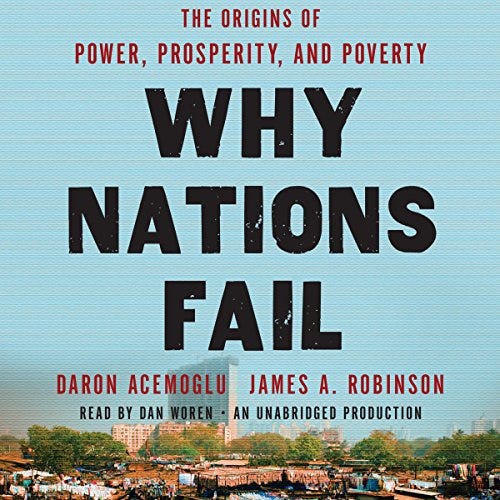The Research HUB: Why Nations Fail
The Truth About Geopolitics
When I think about trying to understand the world in all of its inherent complexities, I assume it will take a lifetime. One thing I mentioned in my interview with Jaymes (link) was that I assume building a skillset and knowledge base in any domain will likely take 5-10 years. I say this under the assumption that I am working incredibly hard and efficiently.
When people assume they can master a craft in a few years or even a few months, I just think to myself, you’re probably not pushing yourself enough in the thing you are pursuing or you have unrealistic expectations.
Nothing exceptional takes a small amount of time.
When approaching the world of international relations, geopolitics, and global capital flows, there is a broad array of books that are incredibly helpful. One of these books is, Why Nations Fail. I found this book helpful in my thought process very early on because of the TYPE of questions it asked. Some books give you information and other books provide you with the questions to ask in order to build a framework for analyzing information. Why Nations Fail is the latter.
One of the main distinctions that the authors made was between inclusive and extractive institutions:
Inclusive vs. Extractive Institutions:
Inclusive Institutions: These are institutions that allow and encourage participation by the great mass of people in economic activities that make best use of their talents and skills and that enable individuals to make the choices they wish.
Extractive Institutions: Conversely, extractive institutions are designed to extract incomes and wealth from one subset of society to benefit a different subset.
Central Thesis of the Book:
The authors argue that the primary determinant of a nation's prosperity is its institutions. Specifically, nations with inclusive political and economic institutions are more likely to achieve sustained prosperity.
Historical Examples:
The book provides numerous historical and contemporary examples from different countries to illustrate the impact of institutions on economic development.
For instance, the contrasting economic trajectories of North and South Korea, the different development paths of the United States and Mexico, and the rapid industrialization of Great Britain are analyzed through the lens of their respective institutional frameworks.
The authors expand on this tension by talking about feedback loops and the role of centralized power:
Vicious and Virtuous Circles:
Extractive institutions often create a vicious circle, where they enrich a small elite that then has an interest in maintaining these institutions, perpetuating poverty and stifling innovation.
Inclusive institutions, on the other hand, create a virtuous circle, promoting innovation, economic growth, and further inclusiveness.
Role of Centralized Power:
The authors highlight that having a centralized power is crucial to enforce laws, maintain order, and provide public services, but it should be coupled with inclusive institutions to prevent the abuse of power.
Why Does This Framework Matter?
Now you might be thinking, why in the world should I care about this? All I care about is economic data and the next NFP print.
Well, yes and no…….
By its very nature, economic data is only meant to show you the WHAT, not the WHY. For example, GDP has line items and many of those line items are broken down into subcategories. However, the data alone doesn’t tell you WHY something is moving. Sure we have subcategories but we don’t know WHY specific data points are shifting unless we connect it to some bigger causal factor.
What major hedge funds do is account for all economic data points and then connect them to every publically traded company. This is incredibly difficult in itself and requires constant adjustment so you have reasonable visibility.
This is where more of a meta-level comes in because if you know the specific drivers of changes in economic data then your quantification of economic data can become that much more powerful. The issue is that people generally just go off narratives and don’t show how specific goods and services are transmitted through the economic data to impact price action.
Inversely, some people only know economic data and don’t know any of the WHY’s behind it so sometimes they are caught offsides at inflection points.
All of this comes back down to having an informational edge in markets. The starting point is actually understanding what other people know and how they think. When we approach the geopolitics situation, we have an impulse from the Israel situation that has marginally impacted markets. It is when you can connect this all the way through to economic data, their current expectations, and how the market is pricing the future distribution is when you begin to increase your edge.
All of this is incredibly difficult but like I said…………….
Nothing exceptional takes a small amount of time.
Thanks for reading!




on the same subject, see also Douglass North: https://www.amazon.com/Institutions-Institutional-Performance-Political-Decisions/dp/0521397340